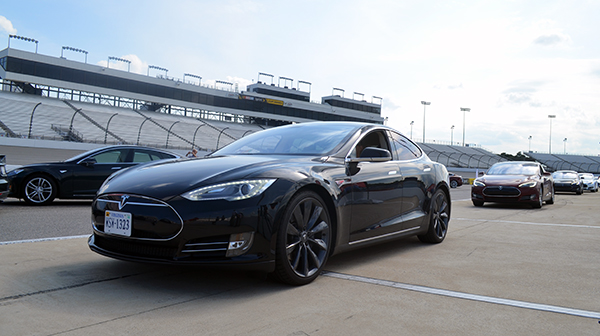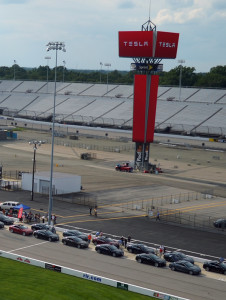Richmond International Raceway has never seen such a quiet rally.
The Tesla Motors roadshow made a pit stop last week at RIR, drawing more than 45 of the company’s Virginia customers to speed their high-end electric cars around the banked turns of the raceway.
With several state legislators in attendance, the event was about more than showing off cars.
Tesla said it thinks Virginia is fertile ground for its vehicles, but the state Department of Motor Vehicles has refused to let the California-based company open a dealership in the commonwealth. Virginia franchise laws prohibit manufacturers from selling cars directly to consumers, which is the crux of Tesla’s business model. So customers in Virginia are left to order the cars from Tesla and have them shipped across the country.
Tesla owners at the track last week said the protectionist rules go against the spirit of free markets.
“It doesn’t make sense to me that an entrepreneur making an American-made care can’t sell it in Virginia, the birthplace of America, where Patrick Henry gave his ‘Give me liberty’ speech and all those shenanigans,” said Hugh Joyce, president of Richmond-based James River Air Conditioning Company and owner of a Tesla Model S, which he calls “the most important car since the Model T.”
Released in 2012, the Model S starts at $62,500 and can cost more than $100,000. It has won a flurry of awards, including Motor Trend’s “Car of the Year” honor for 2013.
The four-door sedan does not have an internal combustion engine or a transmission: It’s powered by a battery that can last for up to 265 miles, according to EPA estimates. (A lower-end option can last 208 miles, according to EPA estimates.)
Tesla last year applied for a license through the Virginia DMV. An exemption under state law can allow manufacturers to sell cars if no existing dealer can sell their vehicles “consistent with the public interest.”
Following two separate public hearings, a DMV hearing officer twice recommended that the state grant Tesla a dealership license.
But in April, DMV commissioner Richard Holcomb rejected the company’s application after the Virginia Automobile Dealership Association announced it didn’t support Tesla’s appeal.
The resistance from traditional dealerships came as no surprise to Tesla.
“There’s an inherent conflict of interest in talking about the advantages of Tesla versus gasoline motors, and no dealer can make a profit selling Tesla alone,” said James Chen, Tesla’s director of public policy.
The Virginia Automobile Dealership Association did not respond to requests for comment.
Tesla in June filed a civil suit in Fairfax County Circuit Court challenging the DMV ruling. The suit references 14 similar cases where the DMV granted an exemption to manufacturers.
DMV spokesperson Sunni Brown said she could not comment on the lawsuit.
Virginia is not the only state where Tesla is squabbling with regulators.
In May, the Texas state legislature killed two bills that would allow U.S.-based manufacturers of electric vehicles to sell to Texans. Despite opposition, Tesla is also fighting to sell its vehicles in Massachusetts and North Carolina.
Still, gaining ground in Virginia is crucial for Tesla because of its location, Chen said. The commonwealth is the midpoint of the I-95 corridor, and Tesla wants to install superchargers in the state to give drivers cruising from Maine to Miami a place to plug in.
Tesla has 27 stores in 10 states and the District of Columbia. It operates five showrooms in four states, including a Tysons Corner location in Virginia. But the showrooms are for showing, not selling.
Tesla employs 5,000 people and produces 20,000 cars each year at its plant in Fremont, Calif. About half of the cars are shipped overseas.
Chen said the traditional dealership model isn’t built for Tesla – at least not until the company increases its output. The manufacturer is looking to do just that with a planned 2016-2017 release of its third generation car.
The company plans to produce 100,000 to 200,000 of the new car each year, Chen said, and start its pricing between $30,000 and $40,000.
Richmond International Raceway has never seen such a quiet rally.
The Tesla Motors roadshow made a pit stop last week at RIR, drawing more than 45 of the company’s Virginia customers to speed their high-end electric cars around the banked turns of the raceway.
With several state legislators in attendance, the event was about more than showing off cars.
Tesla said it thinks Virginia is fertile ground for its vehicles, but the state Department of Motor Vehicles has refused to let the California-based company open a dealership in the commonwealth. Virginia franchise laws prohibit manufacturers from selling cars directly to consumers, which is the crux of Tesla’s business model. So customers in Virginia are left to order the cars from Tesla and have them shipped across the country.
Tesla owners at the track last week said the protectionist rules go against the spirit of free markets.
“It doesn’t make sense to me that an entrepreneur making an American-made care can’t sell it in Virginia, the birthplace of America, where Patrick Henry gave his ‘Give me liberty’ speech and all those shenanigans,” said Hugh Joyce, president of Richmond-based James River Air Conditioning Company and owner of a Tesla Model S, which he calls “the most important car since the Model T.”
Released in 2012, the Model S starts at $62,500 and can cost more than $100,000. It has won a flurry of awards, including Motor Trend’s “Car of the Year” honor for 2013.
The four-door sedan does not have an internal combustion engine or a transmission: It’s powered by a battery that can last for up to 265 miles, according to EPA estimates. (A lower-end option can last 208 miles, according to EPA estimates.)
Tesla last year applied for a license through the Virginia DMV. An exemption under state law can allow manufacturers to sell cars if no existing dealer can sell their vehicles “consistent with the public interest.”
Following two separate public hearings, a DMV hearing officer twice recommended that the state grant Tesla a dealership license.
But in April, DMV commissioner Richard Holcomb rejected the company’s application after the Virginia Automobile Dealership Association announced it didn’t support Tesla’s appeal.
The resistance from traditional dealerships came as no surprise to Tesla.
“There’s an inherent conflict of interest in talking about the advantages of Tesla versus gasoline motors, and no dealer can make a profit selling Tesla alone,” said James Chen, Tesla’s director of public policy.
The Virginia Automobile Dealership Association did not respond to requests for comment.
Tesla in June filed a civil suit in Fairfax County Circuit Court challenging the DMV ruling. The suit references 14 similar cases where the DMV granted an exemption to manufacturers.
DMV spokesperson Sunni Brown said she could not comment on the lawsuit.
Virginia is not the only state where Tesla is squabbling with regulators.
In May, the Texas state legislature killed two bills that would allow U.S.-based manufacturers of electric vehicles to sell to Texans. Despite opposition, Tesla is also fighting to sell its vehicles in Massachusetts and North Carolina.
Still, gaining ground in Virginia is crucial for Tesla because of its location, Chen said. The commonwealth is the midpoint of the I-95 corridor, and Tesla wants to install superchargers in the state to give drivers cruising from Maine to Miami a place to plug in.
Tesla has 27 stores in 10 states and the District of Columbia. It operates five showrooms in four states, including a Tysons Corner location in Virginia. But the showrooms are for showing, not selling.
Tesla employs 5,000 people and produces 20,000 cars each year at its plant in Fremont, Calif. About half of the cars are shipped overseas.
Chen said the traditional dealership model isn’t built for Tesla – at least not until the company increases its output. The manufacturer is looking to do just that with a planned 2016-2017 release of its third generation car.
The company plans to produce 100,000 to 200,000 of the new car each year, Chen said, and start its pricing between $30,000 and $40,000.





The denial of a license to sell vehicles by DMV is protectionism and crony capitalism, pure and simple. It hardly fits with a state that has a reputation as a “good place to do business.” Apparently, it’s only a good place to do business if you crony up to the regulators. Insiders are treated with deference while outsiders get no invitation to do business in the Commonwealth. As we have seen in the last few months at higher levels of government, financial support begets attention. Signed: A happy Tesla owner.
Wait, let me get this straight. They had a 2 separate hearings by DMV officers who both recommended that Tesla be approved with a license.
And the commissioner Richard Holcomb rejected t because VADA told him to reject it?
Who is running the government in Virginia, the officials or VADA? what next, elections canceled because VADA rejected them?
The DMV should be neutral and not take the side of anyone. Commissioner Richard Holcomb should be investigated for corruption.
Very interesting article. Sad to see that Virginia government is apparently committed to crippling what could be a great source for jobs in the state (and additional tax revenue from a company that’s clearly going places). I wonder if this has anything to do with our governor’s attack on green vehicles (repealing the tax credit for green vehicles because such vehicles circumvent the gas tax).
Tesla Model S is the future. We are waiting for the low cost version of Tesla…